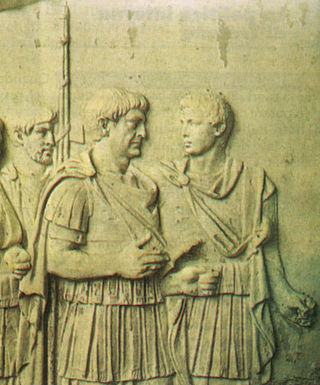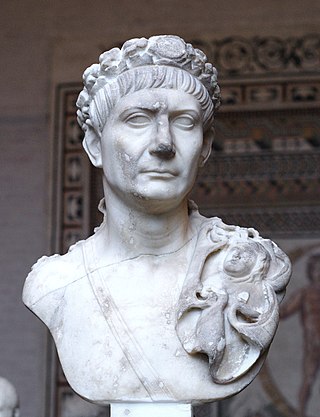Related Research Articles

The 110s was a decade that ran from January 1, AD 110, to December 31, AD 119.
The gens Acilia was a plebeian family at ancient Rome, that flourished from the middle of the third century BC until at least the fifth century AD, a period of seven hundred years. The first of the gens to achieve prominence was Gaius Acilius, who was quaestor in 203 and tribune of the plebs in 197 BC.
The gens Bruttia was an ancient Roman family during the late Republic and into imperial times. None of the gens obtained any important magistracies until the latter half of the first century AD, when Lucius Bruttius Maximus was proconsul in Cyprus.

The gens Valeria was a patrician family at ancient Rome, prominent from the very beginning of the Republic to the latest period of the Empire. Publius Valerius Poplicola was one of the consuls in 509 BC, the year that saw the overthrow of the Tarquins, and the members of his family were among the most celebrated statesmen and generals at the beginning of the Republic. Over the next ten centuries, few gentes produced as many distinguished men, and at every period the name of Valerius was constantly to be found in the lists of annual magistrates, and held in the highest honour. Several of the emperors claimed descent from the Valerii, whose name they bore as part of their official nomenclature.
The gens Fulvia, originally Foulvia, was one of the most illustrious plebeian families at ancient Rome. Members of this gens first came to prominence during the middle Republic; the first to attain the consulship was Lucius Fulvius Curvus in 322 BC. From that time, the Fulvii were active in the politics of the Roman state, and gained a reputation for excellent military leaders.

Lucius Licinius Sura was an influential Roman Senator from Tarraco, Hispania, a close friend of the Emperor Trajan and three times consul, in a period when three consulates were very rare for non-members of the Imperial family. The dates of two of these consulates are certain: in 102 and 107 AD he was consul ordinarius; the date of his first consulate, as a suffect consul has been debated. Fausto Zevi postulated that he was also suffect consul in 97, based on a plausible restoration of part of the Fasti Ostienses, which reads "..]us". However, two more recently recovered fragments of military diplomas show that the name of this consul is L. Pomponius Maternus, who is otherwise unknown. Most authorities have returned to endorsing C.P. Jones' surmise that Sura was consul for the first time in the year 93. He was a correspondent of Pliny the Younger.

Bruttia Crispina was Roman empress from 178 to 191 as the consort of Roman emperor Commodus. Her marriage to Commodus did not produce an heir, and her husband was instead succeeded by Pertinax.

Trajan's First Dacian War took place from 101 to 102.
Gaius Bruttius Praesens Lucius Fulvius Rusticus was an important Roman senator of the reigns of the emperors Trajan, Hadrian and Antoninus Pius. A friend of Pliny the Younger and Hadrian, he was twice consul, governed provinces, commanded armies and ended his career as Urban prefect of Rome. Bruttius’ life and career left few coherent traces in the literary record, but a number of inscriptions, including his complete cursus honorum, fills out the picture considerably.
Lucius Fulvius Gaius Bruttius Praesens Laberius Maximus was a Roman senator who held a number of imperial appointments during the reigns of emperors Antoninus Pius, Marcus Aurelius and Commodus, and was twice consul. Although he was the recipient of one of the letters of Pliny the Younger, most of what we know about him comes from inscriptions.
Lucius Bruttius Quintius Crispinus was a Roman senator who lived in the second century AD. He was ordinary consul in 187, and Lucius Roscius Aelianus Paculus was his colleague.
Lucius Laberius Maximus was a governor of Roman Egypt in 83 CE, and prefect of the imperial bodyguard, known as the Praetorian Guard, during the reign of Roman Emperor Domitian, in 84 CE.

The gens Vibia was a plebeian family at ancient Rome. Although individuals named Vibius appear in history during the time of the Second Punic War, no members of this gens are found at Rome until the final century of the Republic. The first of the Vibii to obtain the consulship was Gaius Vibius Pansa in 43 BC, and from then until imperial times the Vibii regularly filled the highest offices of the Roman state. The emperors Trebonianus Gallus and Volusianus each claimed descent from the family.

The gens Ulpia was a Roman family that rose to prominence during the first century AD. The gens is best known from the emperor Marcus Ulpius Trajanus, who reigned from AD 98 to 117. The Thirtieth Legion took its name, Ulpia, in his honor. The city of Serdica, modern day Sofia, was renamed as Ulpia Serdica.
Lucius Catilius Severus Julianus Claudius Reginus was a Roman senator and general active during the reigns of Trajan and Hadrian. He was appointed consul twice: the first time in 110 CE with Gaius Erucianus Silo as his colleague; the second in the year 120 with the future emperor Antoninus Pius as his colleague. Catilius was also the step-great-grandfather of the emperor Marcus Aurelius.
Sextus Erucius Clarus was a Roman senator and aristocrat. He was Urban prefect and twice consul, the second time for the year AD 146. Clarus was the nephew of Gaius Septicius Clarus, a friend of Pliny the Younger.
The gens Laberia was a minor plebeian family at ancient Rome. Members of this gens are first mentioned in the second century BC, at which time they held senatorial rank. Most of the members mentioned later were equites, but toward end of the first century AD they attained the consulship, which several of them held throughout the second century.
Marcus Junius Homullus was a Roman senator active in the late 1st and early 2nd centuries AD, who occupied a number of offices in the imperial service. He also served as suffect consul for the nundinium of September to December 102 as the colleague of Lucius Antonius Albus. Bernard Rémy notes that his cognomen, "Homullus", appears primarily in Italy, so this may be where his origins lie.
The gens Rubria was a plebeian family at ancient Rome. Members of this gens are first mentioned in the time of the Gracchi, but they did not rise to prominence until imperial times. The first of the Rubrii to obtain the consulship was Rubrius Gallus, some time before AD 68.
References
- ↑ Paul Gallivan, "The Fasti for A. D. 70-96", Classical Quarterly , 31 (1981), pp. 191, 217
- ↑ Alison E. Cooley, The Cambridge Manual of Latin Epigraphy (Cambridge: University Press, 2012), p. 467
- ↑ Werner Eck, "Jahres- und Provinzialfasten der senatorischen Statthalter von 69/70 bis 138/139", Chiron , 12 (1982), pp. 334-336
- ↑ See Pliny, Epistulae , X, 74
- ↑ Dio, LVIII. 9
- ↑ Hadrian, V. 5